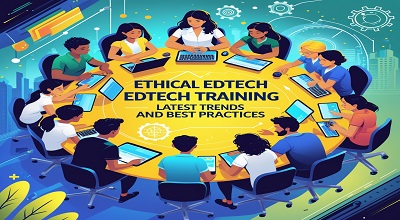Ethical EdTech Training
Ethical EdTech Training: The rapid integration of technology in education has transformed teaching and learning, but it also raises critical ethical concerns. The Ethical EdTech training ensures that educators, students, and institutions use technology responsibly, safeguarding privacy, equity, and digital well-being. In this comprehensive guide, we explore the latest trends, challenges, and best practices in ethical EdTech training, helping educators make informed decisions.
Understanding Ethical EdTech
Definition and Importance
Ethical EdTech refers to the responsible use of educational technology, ensuring fairness, transparency, and respect for user rights. It involves:
- Protecting student data privacy
- Avoiding algorithmic bias
- Promoting digital equity
Key Ethical Concerns in EdTech
- Data Privacy: Unauthorized collection and misuse of student data.
- Algorithmic Bias: AI-driven tools reinforcing stereotypes.
- Digital Divide: Unequal access to technology among students.
Latest Trends in Ethical EdTech Training
AI and Ethical Considerations
AI-powered tools (like chatbots and adaptive learning platforms) must be:
- Transparent in decision-making
- Free from discriminatory biases
- Regularly audited for fairness
Data Privacy and Security
- Compliance with GDPR, COPPA, and FERPA
- Encryption and secure storage of student data
- Consent-based data collection
Digital Equity and Inclusion
- Providing affordable devices and internet access
- Designing accessible EdTech for students with disabilities
- Culturally responsive content
Best Practices for Ethical EdTech Implementation
Teacher Training and Professional Development
- Workshops on digital ethics
- Training on identifying biased algorithms
- Encouraging critical evaluation of EdTech tools
Student Data Protection
- Minimal data collection (only what’s necessary)
- Anonymization techniques
- Regular security audits
Ethical Use of AI in Education
- Explainable AI (users understand how decisions are made)
- Human oversight in automated grading
- Bias mitigation strategies
Challenges and Solutions
Bias in EdTech Algorithms
- Problem: AI may favor certain student demographics.
- Solution: Diverse training datasets and bias audits.
Over-reliance on Technology
- Problem: Reduced human interaction in learning.
- Solution: Blended learning models.
Regulatory Compliance
- Problem: Navigating complex laws like GDPR.
- Solution: Hiring compliance experts and regular training.
Case Studies: Ethical EdTech in Action
1: AI-Powered Tutoring System
- Challenge: Bias against non-native English speakers.
- Solution: Retraining the model with diverse language inputs.
2: Student Data Privacy in a School District
- Challenge: Data breaches in cloud-based platforms.
- Solution: Multi-factor authentication and encryption.
More Here: Multimodal AI
Future of Ethical EdTech Training
Emerging Technologies
- Blockchain for secure credentialing
- VR/AR with ethical content guidelines
Policy and Governance
- Global standards for EdTech ethics
- Stronger penalties for data misuse
Conclusion
Ethical EdTech training is crucial for a fair, secure, and inclusive digital learning environment. By staying updated on privacy laws, AI ethics, and digital equity, educators can harness technology responsibly.
Free Here: Best Crypto Search APK
